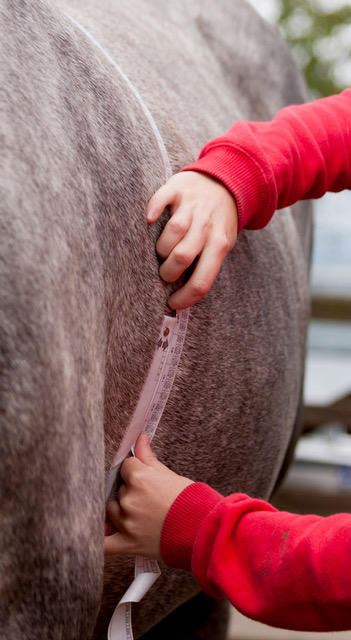Weighing Horses: The Truth About Weight Tapes
By Kentucky Equine Research Staff:
The mighty weight tape: simplistic in design and easy to use, yet concerningly inaccurate in some situations. Does this mean that weight tapes are useless? Not at all, though they should be employed with an understanding of factors that may affect the reading.
To better understand weight tape measurements, a study conducted by a Scottish research team retrospectively reviewed data from 1,716 horses over two years of age.* Primary information collected included weight-tape weight and actual body weight determined by a calibrated scale. Additional data involved breed, body condition score (BCS), height, muscle topline score (rated from poor to excellent), and bone type (heavy, medium, or light).
In this study, correct use of the weight tape was described. With the horse standing on a level surface, the tape was used by a single operator who placed the end of the tape on the horse’s body behind the point of the elbow. The tape was then extended in a straight vertical line over the withers, placed around the circumference of the horse’s barrel, and returned to the starting point. The final measurement was made after the horse had fully exhaled with it standing square and head in a relaxed position.
Data analysis supported the researchers’ hypothesis that weight-tape readings would differ from true body weight.
“Deviations ranged from only 2-4 lb (1-2 kg) in some cases to over 220 lb (100 kg) in others. On average, the weight tape underestimated weight, meaning the horse’s actual body weight was higher,” explained Catherine Whitehouse, M.S., a Kentucky Equine Research nutrition advisor.
Breed appeared to influence results. In this study, weight tapes provided more accurate measurements for pony breeds, while the weight of larger, heavier horses tended to be underestimated by weight tapes.
Height and muscling, assessed via topline scoring, did not appear to affect the weight-tape readings.
Having an accurate estimate of body weight is important when calculating drug doses, such as antibiotics and dewormers, as well as for determining how much forage and supplemental feeds to offer.
“In the case of overweight horses, accurate body weights are helpful in developing suitable weight-loss programs to achieve ideal body weight and condition scores. Researchers have estimated how much body weight represents a change in body condition score, making it practical for owners to assess their horse’s weight status and monitor changes even when accurate weight assessments such as scales or weight tapes are not available,” advised Whitehouse.
Obesity among horses is at an all-time high, affecting almost every discipline in the industry.
“Excess body weight is detrimental because it places excess forces on the musculoskeletal system, reduces performance, and increases the risk of developing health conditions,” Whitehouse said.
She added, “Obesity also contributes to insulin dysregulation and hyperinsulinemia, which can bring about laminitis. In fact, hyperinsulinemia-associated laminitis is currently the leading cause of laminitis in horses.”
“This study showed that a weight tape cannot be relied on to provide an accurate measure of body weight, particularly for heavier horses. However, the weight tape is still a useful and accessible tool for estimating body weight for weight-management purposes. For example, if weight loss is the desired outcome, as opposed to knowing the actual weight, then a weight tape showing a progressive decrease in body weight is still useful,” advised Whitehouse.
For more resources on body condition scoring and weight management, visit the Body Condition Resources page on the Kentucky Equine Research website.
*Grimwood, K., B. Lancaster, and I. Handel. 2023. Factors affecting weigh tape reading in the measurement of equine body weight. Animals (Basel) 13(8):1330.











